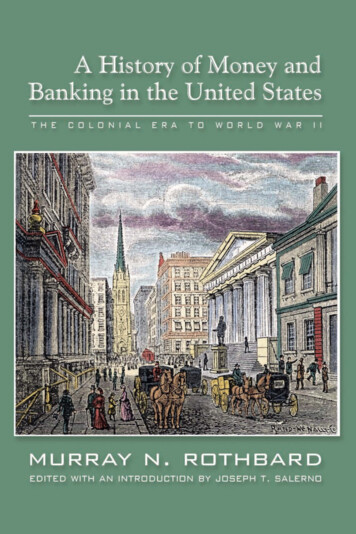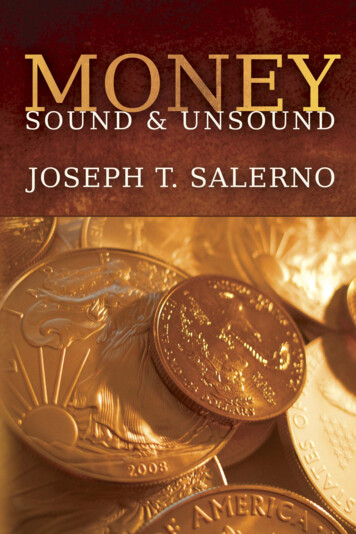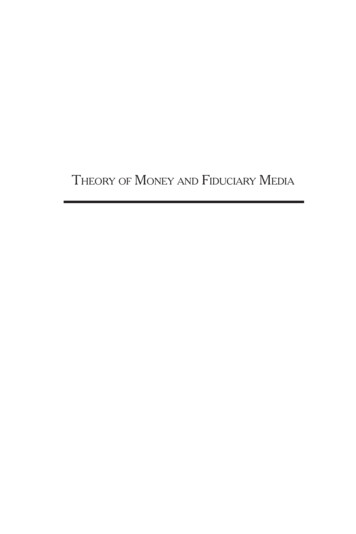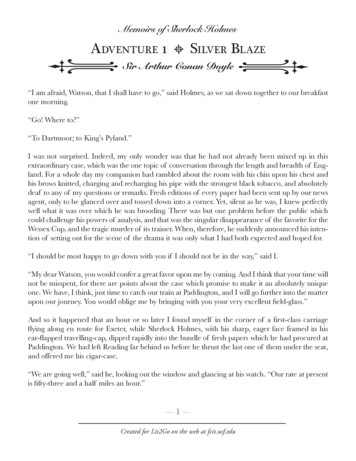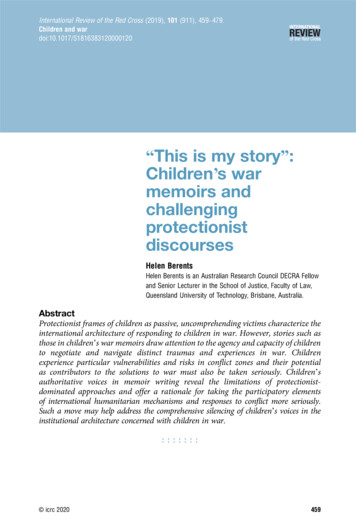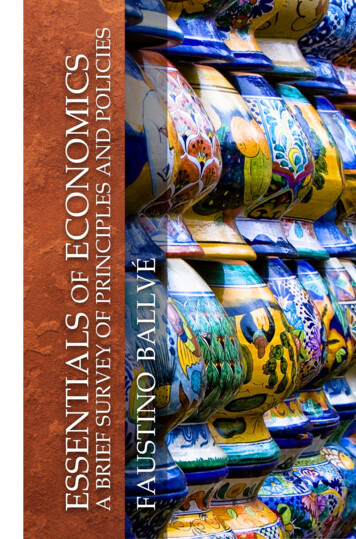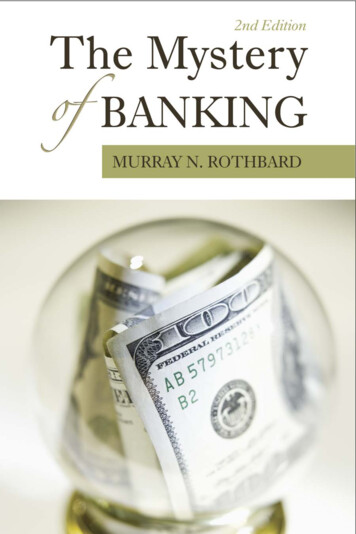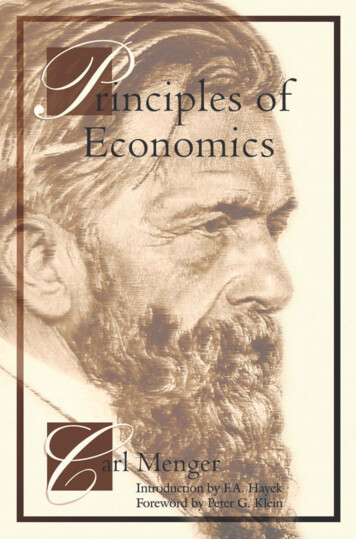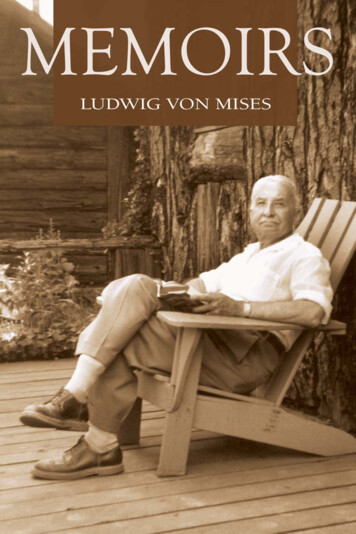
Transcription
MEMOIRS
The Ludwig von Mises Institute dedicatesthis volume to all of its generous donorsand wishes to thank these Patrons, in particular:Mary and Bill BraumHugh E. Ledbetter Todd GibsonFrederick L. Maier Mr. and Mrs. Wesley B. Alexander, Ross K. Anderson, Anonymous,David Atherton, Mr. and Mrs. David Baumgardner, Steven R. Berger,John Hamilton Bolstad, Mr. and Mrs. J. Robert Bost,Wayne Chapeskie, Dan H. Courtney, Mr. and Mrs. Jeremy S. Davis,Kevin P. Duffy, Evans Cabinet Corp., Mr. and Mrs. Brian Gladish,Paul F. Glenn, Keith M. Harnish, Bernard G. Koether II,Hunter Lewis, Arthur L. Loeb, Mr. and Mrs. William Lowndes III,Mr. and Mrs. William W. Massey, Jr., Joseph Edward Paul Melville,Robert A. Moore, Terence Murphree, Mr. and Mrs. R. Nelson Nash,Laurence A. Peterson, Mr. and Mrs. Ronald L. Peterson,Mr. William D. Plumley, Mr. and Mrs. Wilfried A. Puscher,Ann V. Rogers, Sheldon Rose, Thomas S. Ross, Norman K. Singleton,Mr. and Mrs. Dennis A. Sperduto, Donnie R. Stacy, M.D.,James R. Von Ehr, Dr. Thomas L. Wenck, James M. Wolfe
MEMOIRSLUDWIGTRANSLATEDBYVONMISESARLENE OOST-ZINNERLvMILudwig von Mises Institute
Copyright 2009 by the Ludwig von Mises Institute and publishedunder the Creative Commons Attribution License 3.0.http://creativecommons.org/licenses/by/3.0.For information write the Ludwig von Mises Institute, 518 WestMagnolia Avenue, Auburn, Alabama 36832. Mises.org.ISBN: 978-1-933550-26-8
ContentsPreface by Jörg Guido Hülsmann . . . . . . . . . . . . . . . . . . . . . . . . . . viiIntroduction by F.A. Hayek . . . . . . . . . . . . . . . . . . . . . . . . . . . . . . . xiii123456789101112131415Historicism . . . . . . . . . . . . . . . . . . . . . . . . . . . . . . . . . . . . . . . . . 1Etatism . . . . . . . . . . . . . . . . . . . . . . . . . . . . . . . . . . . . . . . . . . . 11The Austrian Problem. . . . . . . . . . . . . . . . . . . . . . . . . . . . . . . 21The Austrian School of Economics . . . . . . . . . . . . . . . . . . . . 25First Writings on the Theory of Money. . . . . . . . . . . . . . . . . 33The Theory of Money and Credit . . . . . . . . . . . . . . . . . . . . . 43The First World War . . . . . . . . . . . . . . . . . . . . . . . . . . . . . . . . 51With the Handelskammer . . . . . . . . . . . . . . . . . . . . . . . . . . . . 57My Teaching Activities in Vienna . . . . . . . . . . . . . . . . . . . . . 77Scientific Work in Germany . . . . . . . . . . . . . . . . . . . . . . . . . . 85Further Studies in Indirect Exchange . . . . . . . . . . . . . . . . . . 91Systems of Social Cooperation . . . . . . . . . . . . . . . . . . . . . . . . 97Epistemological Studies . . . . . . . . . . . . . . . . . . . . . . . . . . . . 103My Teaching Activities in Geneva . . . . . . . . . . . . . . . . . . . . 113The Struggle for Austria’s Survival . . . . . . . . . . . . . . . . . . . 117Index . . . . . . . . . . . . . . . . . . . . . . . . . . . . . . . . . . . . . . . . . . . . . . . . . 121v
PrefaceLudwig von Mises is the author of dozens of books andhundreds of articles in which he made pioneering contributions to economics, history, the philosophy of science,and social philosophy. He had a direct personal influence onmany outstanding social scientists such as F.A. Hayek, FritzMachlup, Oskar Morgenstern, Gottfried von Haberler, HansSennholz, Murray Rothbard, George Reisman, Ralph Raico,Leonard Liggio, Israel Kirzner, Paul Cantor, and others whoattended his seminars from the 1920s to the 1960s. In the interwar period he was also a major economic advisor to the government in his native Austria.And yet, today we still know amazingly few things about thisman. Much if not most of what we know is based on the presentautobiographical recollections, which Mises started to writeupon his arrival in the United States in August 1940. By the endof that year he had finished a first draft of the German-languagemanuscript and then polished his memoirs for another twoyears. Finally he gave the handwritten text to his wife Margit forcustody and eventual publication. In 1978, five years after hisdeath, she published both the German original and an Englishtranslation from the pen of Hans Sennholz.11SeeMises, Erinnerungen von Ludwig v. Mises (Stuttgart: Gustav Fischer, 1978); idem Notes and Recollections (South Holland, Ill.: Libertarianvii
viiiMemoirsThe memoirs cover his intellectual development from youthto 1940. Thus they are essential and fascinating reading for allstudents of Austrian economics and of the history of ideas.They are similarly important for students of world politics inthe twentieth century. In fact, Mises’s memoirs are a uniquesource of inside information about the economics and politics ofthe first Republic of Austria. They portray his professional lifefrom about 1906 (year when he graduated with a doctorate inlaw from the University of Vienna) to 1940, stressing his activities in the Vienna Chamber of Commerce, in World War I, ingovernment, and in academia. He not only knew the intellectuals of his day, he had almost daily interaction with the politicalleaders of his country, with the higher echelons of the civil service, and with the executives of Austrian firms and business corporations. Today this might seem to be largely irrelevant localhistory, but in fact it is not. The little Republic of Austria was theheiress of the great Habsburg Empire that had just crumbled in1918. In the 1920s and 1930s, the country still played an important role in world politics, most notably in its opposition to theburgeoning political movements of Bolshevism and NationalSocialism. It is not exaggerated to say that one cannot fully graspworld politics in the twentieth century without a thoroughunderstanding of Austrian politics in the interwar period. Thepresent memoirs are a precious key to such understanding. Theyare unique in that their author was not just an insider, but aninsider who understood the key economic issues of his time farbetter than most other protagonists.2Press, 1978). Meanwhile, translations into the Italian, Spanish, andFrench languages have been published: Autobiografia di un liberale (Soveria Mannelli: Rubettino, 1996); Autobiografía de un Liberal (Madrid:Unión Editorial, 2001); Souvenirs d’Europe ises is today mainly known for his contributions to economictheory. But he is also an important historian of contemporary totalitarian
PrefaceixWhat do the memoirs tell us about their author? What doesMises reveal about himself? Not much. He essentially confineshimself to a narration of his intellectual development and public life. There is no word on the following pages about hisdreams and feelings, love affairs, personal income and wealth,passions, and temptations; no word about daily family life or hisattitudes toward parents, brothers, house personnel, cousins,teachers, or neighbors; no word about car accidents or brokenlegs.This is fully in line with his other writings and personalrecords. Even in his letters he handled such private matters withgreat discretion. All through his life he studiously avoided writing and publishing about himself, even though he played arather remarkable personal role as we have already noticed.3Implicitly, however, the memoirs actually do tell us a fewthings about Mises the man.movements. See in particular Mises, Nation, State, and Economy (1919);idem, Omnipotent Government (1944); idem, Planned Chaos (1947). Hisvery first publications as a young scholar (1902–1906) also dealt with historical problems, though in those days he was under the influence of historicist and interventionist ideas which he later rejected, as explained inthe present work.3Apart from the memoirs (which he did not publish), the only pieceof writing in which Mises discussed his own ideas is an address deliveredto the economics department of New York University, in November 1940,in the context of a job search in his new home country. See Mises, “MyContributions to Economic Theory,” Planning for Freedom, 4th ed.(South Holland, Ill.: Libertarian Press, 1980), pp. 224–33. In his theoretical writings he made numerous comments on the history of ideas, butnext to never on his own ideas. In the 1960s he published a small booklet on the history of the Austrian School of economics, in which he alsodid not get to the point of talking about himself. See Mises, The Historical Setting of the Austrian School of Economics (1962, 1969; reprintedAuburn, Ala.: Ludwig von Mises Institute, 1984 and 2007).
xMemoirsIt is first of all significant that in his recollections he chose tofocus exclusively on his public persona, though admittedly it isnot quite clear what this focus signifies precisely. It could havebeen the outgrowth of anxiety or feelings of vulnerability. Misesmight have feared that, in writing about his emotions, he mightnot be able to control language and thought as much as whenwriting about politics and economics. In actual fact he did notalways control himself in situations of private conflict, in particular, when he had arguments with his future spouse.4 However,the focus on his public persona could also reflect his deep-seatedhumility and stoic concern for disentangling matters of commoninterest from those of merely personal interest.Moreover, the memoirs are unique among Mises’s works inthat he makes a great number of blunt statements about the persons with whom he interacted in his professional life. He had areputation of being unable to suffer fools gladly, but he neverstated these opinions in writing. As he relates in the presentbook, he had early on adopted the principle of never writingabout the personal moral shortcomings of his opponents, and offocusing instead on their intellectual errors in order to combatthe latter more effectively. Only in the memoirs—which, again,were not meant for publication during his lifetime—did he talkabout virtues and vices. Now if we look at his heroes and villains, we find the reflections of a stoic value system, cherishingabove all good will, hard work, and expertise, while despisingavarice, pretentiousness, and shallowness.Mises would never write an update to cover the last third ofhis life in America. The memoirs were a balance sheet of his4“Occasionally he showed terrible outbursts of tantrum.” Margit vonMises, My Years with Ludwig von Mises (New Rochelle, N.Y.: ArlingtonHouse, 1976), p. 36.
Prefacexiachievements in the Old World, written in the style of a testament, at the absolute low point of his life—a personal reckoningand a lesson for his future readers. May all readers of this beautiful new translation benefit from it!Jörg Guido HülsmannAngers, FranceFebruary 2009
IntroductionAlthough without a doubt one of the most important economists of his generation, in a certain sense Ludwig vonMises remained an outsider in the academic world untilthe end of his unusually long scholarly career—certainly withinthe German-speaking world—but also during the last third ofhis life, when in the United States he raised a larger circle of students. Before this his strong immediate influence had essentiallybeen restricted to his Viennese Privatseminar, whose membersfor the most part only became attracted to him once they hadcompleted their original studies.If it would not have unduly delayed the publication of thesememoirs, found among his papers, I would have welcomedthe opportunity of analyzing the reasons for this curious neglect of one of the most original thinkers of our time in the fieldThis “Introduction” by F.A. Hayek was written for the Germanlanguage edition of Mises’s Notes and Recollections (Erinnerungen vonLudwig von Mises [Stuttgart: Gustav Fischer, 1978]). It was translatedinto English by Hans-Hermann Hoppe and published in the AustrianEconomics Newsletter (Fall 1988): 1–3. It also appears in the Fortunes ofLiberalism: The Collected Works of F.A. Hayek (Chicago: University ofChicago Press, 1992), pp. 153–59.xiii
xivMemoirsof economics and social philosophy. But in part the fragmentaryautobiography he left provides in itself the answer. The reasonswhy he never acquired a chair at a German-speaking universityduring the twenties or before 1933, while numerous and oftenindisputably highly unimportant persons did, were certainlypersonal. His appointment would have been beneficial for everyuniversity. Yet the instinctive feeling of the professors that hewould not quite fit into their circle was not entirely wrong. Eventhough his subject-knowledge surpassed that of most occupantsof professorial chairs, he was nonetheless never a real specialist.When in the realm of the social sciences I look for similar figures in the history of thought, I do not find them among theprofessors, not even in Adam Smith; instead, he must be compared to thinkers like Voltaire or Montesquieu, Tocqueville andJohn Stuart Mill. This is an impression that has by no meansbeen reached only in retrospect. But when more than fifty yearsago I tried to explain Mises’s position in pretty much the samewords to Wesley Claire Mitchell in New York I only encountered—perhaps understandably—a politely ironic skepticism.Essential to his work is a global interpretation of socialdevelopment. In contrast to the few comparable contemporariessuch as Max Weber, with whom he was connected by a raremutual respect, in this Mises had the advantage of a genuineknowledge of economic theory.The following memoirs say much more about his development, position and views than I know or could tell. I can onlyattempt here to supplement or confirm information regardingthe ten years of his time in Vienna (1921–1931) during which Iwas closely associated with him. I came to him rather characteristically not as a student, but as a fresh Doctor of Law and a civilservant, subordinate to him, at one of those special institutionsthat had been created to execute the provisions of the peacetreaty of St. Germain. The letter of recommendation by my university teacher Friedrich von Wieser, who described me as a
Introductionxvhighly promising young economist, was met by Mises with asmile and the remark that he had never seen me in his lectures.However, when he found my interest confirmed and myknowledge satisfactory, he helped me in every regard and contributed much to make my lengthier visit to the United Statespossible (before the time of the Rockefeller fellowship) to whichI owe a great deal. But although I saw him during the first yearsdaily in an official capacity, I had no idea that he was preparinghis great book, Socialism, which upon its publication in 1922influenced me decisively.Only after I returned from America in the summer of 1924was I admitted to that circle, which had been in existence forsome time, and through which Mises’s scholarly work in Viennamainly exerted its influence. This “Mises Seminar,” as we allcalled the biweekly nightly discussions in his office, is describedin detail in his memoirs. Mises though does not mention thehardly less important regular continuations of the official discussions that lasted long into the night at a Viennese coffeehouse. As he correctly describes, these were not instructionalmeetings, but discussions presided over by an older friend whoseviews were by no means shared by all members. Strictly speaking, only Fritz Machlup was originally Mises’s student. Asregards the others, of the regular members only Richard Strigl,Gottfried Haberler, Oskar Morgenstern, Lene Lieser, andMartha Stefanie Braun were specialists in economics. EwaldSchams and Leo Schönfeld, who belonged to the same highlygifted but early deceased intermediate generation as RichardStrigl, were, to my knowledge, never regular participants in theMises Seminar. But sociologists like Alfred Schütz, philosopherslike Felix Kaufmann and historians like Friedrich Engel-Janosiwere equally active in the discussions, which frequently dealtwith the problems of the methods of the social sciences, butrarely with special problems of economic theory (except those ofthe subjective theory of value). Questions of economic policy,
xviMemoirshowever, were discussed often, and always from the perspectiveof the influence of different social philosophies upon it.All this seemed to be the rare mental distraction of a man,who, during the day, was fully occupied with urgent politicaland economic problems, and who was better informed aboutdaily polities, modern history, and general ideological developments than most others. What he was working on even I, whoofficially saw him almost daily during those years, did notknow; he never spoke about it. We could even less imaginewhen he would actually write his works. I knew only from hissecretary that from time to time he had a manuscript typedfrom his distinctively clear handwriting. But many of his worksonly existed in handwriting until publication, and an importantarticle was considered lost for a long time, until it finally resurfaced among the papers of a journal editor. No one knew anything regarding his private work methods until his marriage. Hedid not speak about his literary activity until he had completeda work. Though he knew that I was most willing to occasionallyhelp him, he only asked me once to look up a quote for his workand this was after I mentioned that I wanted to consult a workon the canonists in the library. He never had, at least in Vienna,a scholarly assistant.The problems with which he concerned himself were mostlyproblems for which he considered the prevailing opinion false.The reader of the following book might gain the impression thathe was prejudiced against the German social sciences as such.This was definitely not the case, even though in the course oftime he developed a certain understandable irritation. But hevalued the great early German theoreticians like Thünen, Hermann, Mangoldt or Gossen more highly than most of his colleagues, and knew them better. Also, among his contemporarieshe valued a few similarly isolated figures such as Dietzel, Pohle,Adolf Weber and Passow, as well as the sociologist Leopold vonWiese and, above all, Max Weber. With Weber a close scholarlyrelationship had been formed during Weber’s short teaching
Introductionxviiactivity in Vienna, in the spring of 1918, which could havemeant a great deal if Weber had not died so soon. But in general,there can be no doubt that he had nothing but contempt for themajority of the professors who, occupying the chairs of the German universities, pretended to teach theoretical economics.Mises does not exaggerate in his description of the teachings ofeconomics as espoused by the historical school. Just how far thelevel of theoretical thinking in Germany had sunk is indicatedby the fact that it needed the simplifications and coarseness ofthe—herein certainly meritorious—Swede Gustav Cassel inorder to again find an audience for theory in Germany.Notwithstanding his exquisite politeness in society and his generally great self-control (he could also occasionally explode),Mises was not the man to successfully hide his contempt.This drove him to increased isolation among professionaleconomists generally as well as among those Viennese circleswith which he had scholarly and professional contacts. Hebecame estranged from his cohorts and fellow students when heturned away from the advancing ideas of social policy. Twentyfive years later I could still feel the emotion and anger his seemingly sudden break had caused—when he had turned awayfrom the dominating ideals of the academic youth of the first fewyears of the century—when his fellow student F.X. Weiss (theeditor of the shorter writings of Böhm-Bawerk) told me aboutthe event with unconcealed indignation, obviously in order toprevent me from a similar betrayal of “social” values and an alltoo-great sympathy for an “outlived” liberalism.If Carl Menger had not aged relatively early and BöhmBawerk had not died so young, Mises probably would havefound support among them. But the only survivor of the olderAustrian School was my revered teacher Friedrich von Wieser,and he was more a Fabian—proud, as he believed, to have provided a scientific justification for progressive income taxationwith his development of the theory of marginal utility.
xviiiMemoirsMises’s return to classical liberalism was not only a reactionto a dominating trend. He completely lacked the adaptability ofhis brilliant seminar fellow Josef Schumpeter, who alwaysquickly accommodated current intellectual fashions, as well asSchumpeter’s joy in “épater le bourgeois” [shocking the middleclasses]. In fact, it appeared to me as if these two most importantrepresentatives of the third generation of leading Austrian economists (one can hardly consider Schumpeter a member of the“Austrian School” in the narrower sense despite all mutual intellectual respect) both got on each other’s nerves.In today’s world Mises and his students are regarded as therepresentatives of the Austrian School, and justifiably so,although he only represents one of the branches into whichMenger’s theories had already been divided by his students, andthe close personal friendship between Eugen von Böhm-Bawerkand Friedrich von Wieser. I only admit this with some hesitation, because I expected much of the tradition of Wieser, whichhis successor Hans Mayer attempted to advance. But theseexpectations have not yet become fulfilled, even though thosestimuli may perhaps still prove more fruitful than they havebeen so far. Today’s active “Austrian School,” almost exclusivelyin the United States, is at base a Mises School that goes back toBöhm-Bawerk, while the man in whom Wieser had set suchgreat hopes and who had succeeded him in his chair never reallyfulfilled the promise.Because he never occupied a regular chair in his field, in theGerman-speaking world, and had to devote most of his time toother-than-scholarly activities until his late fifties, Misesremained an outsider in academia. Other reasons contributed toisolating him in his position in public life and as a representative of a great social-philosophical project. A Jewish intellectualwho advocated socialist ideas had his respected place in theVienna of the first third of this century, a place that was accordedto him as a matter of course. Likewise, the Jewish banker orbusinessman who (bad enough!) defended capitalism had his
Introductionxixrights. But a Jewish intellectual who justified capitalismappeared to most as some sort of monstrosity, something unnatural, which could not be categorized and with which one did notknow how to deal. His undisputed subject-knowledge wasimpressive, and one could not avoid consulting him in criticaleconomic situations, but rarely was his advice understood andfollowed. Mostly he was regarded as somewhat of an eccentricwhose “old-fashioned” ideas were impracticable “today.” Thathe himself had constructed, in long years of hard work, his ownsocial philosophy was only known by very few and perhaps couldnot be understood by distant observers until 1940, when in hisNationalökonomie he presented for the first time his system ofideas in its entirety. But by this time he could no longer reachreaders in Germany and Austria. Apart from the small circle ofyoung theoreticians who met at his office, and some highlygifted friends in the business world who were similarly concerned about the future and who are mentioned in the following, he only encountered genuine understanding among occasional foreign visitors like the Frankfurt banker Albert Hahn,whose work in monetary theory he smiled at, however, as a vainsin of youth.Yet he did not always make it easy for them. The argumentsby which he supported his unpopular views were not alwayscompletely conclusive, even though some reflection could haveshown that he was right. But when he was convinced of his conclusions and had presented them in clear and plain language—a gift that he possessed to a high degree—he believed that thiswould also have to convince others and only prejudice and stubbornness prevented them from understanding. For too long hehad lacked the opportunity of discussing problems with intellectual equals who shared his basic moral convictions in order tosee how even small differences in one’s implicit assumptions canlead to different results. This manifested itself in a certain impatience that was easily suspected of being an unwillingness to
xxMemoirsunderstand, whereas an honest misunderstanding of his arguments was the case.I must admit that I myself often initially did not think hisarguments to be completely convincing and only slowly learnedthat he was mostly right and that, after some reflection, a justification could be found that he had not made explicit. Andtoday, considering the kind of battle that he had to lead, I alsounderstand that he was driven to certain exaggerations, like thatof the a priori character of economic theory, where I could notfollow him.For Mises’s friends of his later years, after his marriage andthe success of his American activity had softened him, the sharpoutbursts in the following memoirs, written at the time of hisgreatest bitterness and hopelessness, might come as a shock. Butthe Mises who speaks from the following pages is without question the Mises we knew from the Vienna of the twenties; ofcourse without the tactful reservation that he invariably displayed in oral expression; but the honest and open expression ofwhat he felt and thought. To a certain extent this may explainhis neglect, even though it does not excuse it. We, who knewhim better, were at times outraged, of course, that he did not geta chair, yet we were not really surprised. He had too much tocriticize about the representatives of the profession into whichhe was seeking entrance to appear acceptable to them. And hefought against an intellectual wave which is now subsiding, notleast because of his efforts, but which was much too powerfulthen for one individual to successfully resist.That they had one of the great thinkers of our time in theirmidst, the Viennese have never understood.F.A. HayekLisbonMay 1977
1HistoricismThe first source of my political and historical indoctrination was the Gartenlaube, the periodical of provincialGermany. In 1888, the year of the three kaisers, it rannumerous illustrated features on the lives of the two who haddied. Not seven years old at the time, I devoured these articleswith great fervor.The historical bias of this family publication presented itselfto me later and more explicitly in the works of the kleindeutsch1historicists. As an Austrian, it was not difficult for me to identifystrong political overtones in their writings. I soon began to seethrough their methods of analysis, which had been unflatteringlyreferred to as falsifications of history. Großdeutsch2 historicists1TheKleindeutsche Lösung (literally “Small German Solution”) wasa nineteenth-century political idea espousing a unified Germany led byHohenzollern Prussia, excluding the Austrian Empire.2The idea of a Großdeutschland (a “Greater Germany”) stood in contrast to that of the Kleindeutsche Lösung. The German parliament electedafter the early successes of the revolution of 1848 was split between the twooptions, with the democratic left favoring a republican Großdeutschland,1
2Memoirswere no more honest or thorough in their work; they weremerely less competent.Upon graduation from high school, the problems of economic, legal, administrative, and social history attracted memore than did those of political history. I decided to study lawrather than history, which had been my earlier plan. At the timethe study of law at Austrian universities was arranged in such away that three to four semesters of the total eight were dedicatedto the history of law exclusively, with the remaining four to fivebeing relegated to political economy and public law. The schoolof law provided students with more favorable options in thestudy of history than did the school of liberal arts. The politicalhistorians who taught in the latter were scholars of third andfourth rank. The only historicist of significance coming out ofAustria at the time was Heinrich Friedjung, who was deniedaccess to an academic career, as the emphasis in historical education at the University of Vienna lay in the study of paleography.In 1900, historicism stood at the zenith of its success. Thehistorical method was considered the sole scientific method ofthe science of human action. From the height of historicalenlightenment, the historical political economist looked downupon the orthodox dogmatist with unspeakable disdain. Economic history was the fashionable science, and, in the Germanspeaking world, Schmoller was considered the master of political economy. Ambitious young men from around the worldflocked to his seminar.I was still in high school when I became aware of a contradiction in the position assumed by those in Schmoller’s circle.On the one hand they rejected the positivist demand for scientificwhere as the liberal center favored a Kleindeutschland with a constitutional monarchy. In the end, the Kleindeutsche Lösung prevailed, but thePrussian king rejected the crown offered to him.
Historicism3law built on a society’s historical experience; on the other handthey were of the opinion that economic theory could beabstracted from a society’s economic experience. It was astonishing to me that this inconsistency was hardly noticed.The relativism of the school, which degenerated into manyof its adherents’ developing a blind adulation of the past and itsinstitutions, also aroused my disapproval. Whereas some fanatics for progress had judged all that was old to be damnable andbad, these pseudohistorians rejected anything new in arduouspreference for the old. At that time I had not yet come to comprehend the significance of liberalism, but the fact that it was anachievement not realized before the eighteenth century provid
lains, we find the reflections of a stoic value system, cherishing above all good will, hard work, and expertise, while despising avarice, pretentiousness, and shallowness. Mises would never write an update to cover the last third of his life in America. The memoirs were a balance sheet of his x Memoirs

